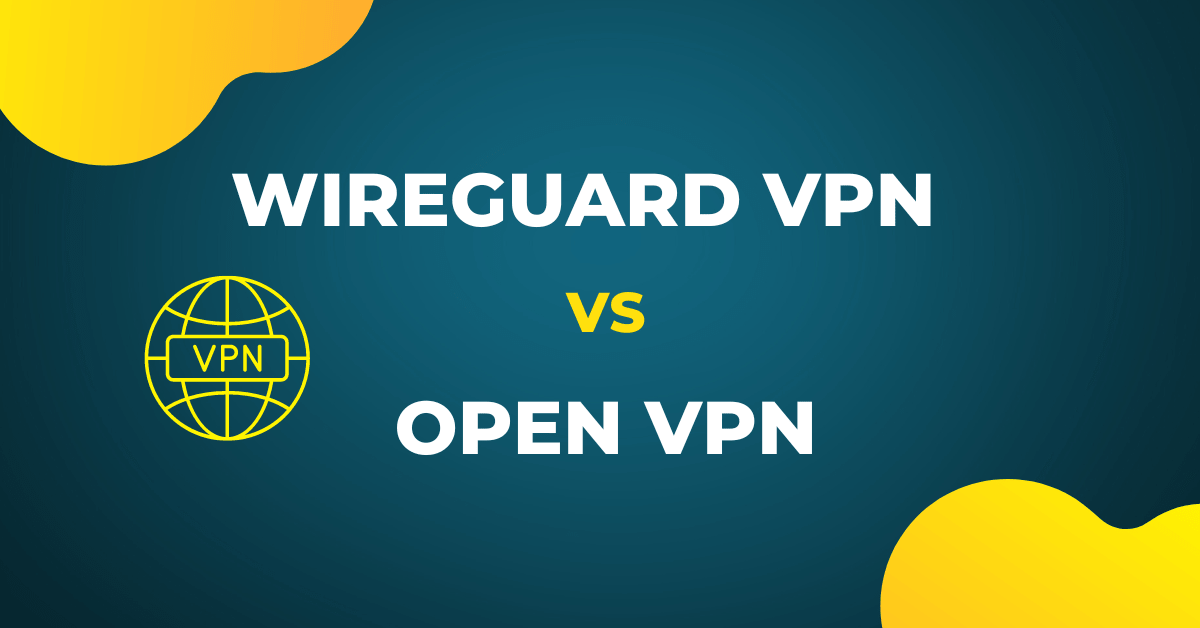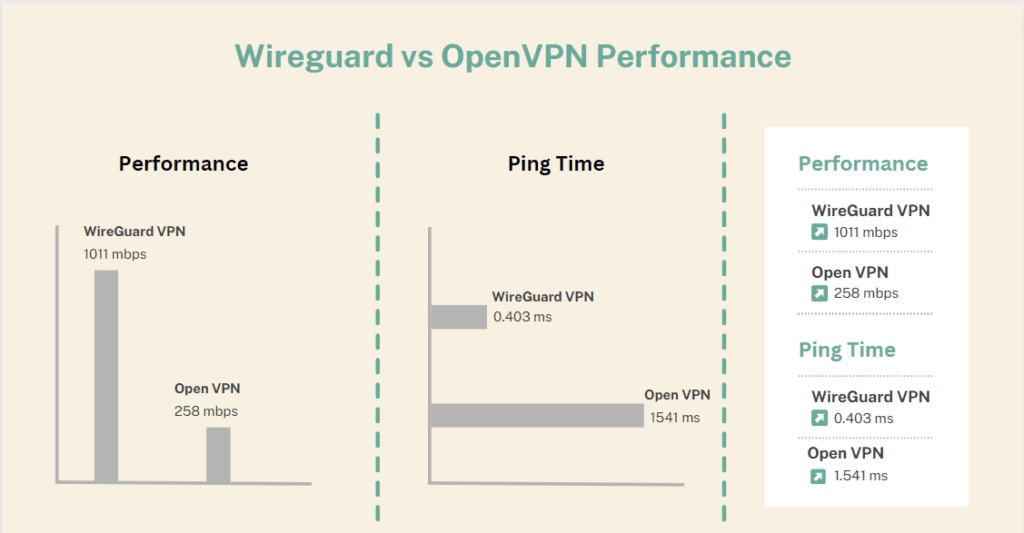Wireguard vs OpenVPN: Key Differences Between the Two Protocols

VPNs( Virtual Private Networks) are used to access the internet securely. It is software that establishes a private connection between your device and a VPN server.
There are many protocols used for VPNs, like SSTP, PPTP, and IPSec/IKEv2, but OpenVPN and WireGuard VPN protocols are the most popular ones. OpenVPN was released in the early 2000s, and WireGuard was released in the late 2010s.
This article will explain all the key differences between OpenVPN and WireGuard, and which one is a better option for you.
[Read more: What Is Wave Browser – Should You Remove It?]
#Quick Summary
OpenVPN and Wireguard are both good protocols with better encryption and security. However, each protocol has its advantages. Lets’ see a few highlights of each protocol quickly.
OpenVPN Highlights
- When we consider privacy, OpenVPN is better than WireGuard.
- Most VPNs and devices support OpenVPN more than Wireguard.
- OpenVPN is superior at bypassing censorship.
Wireguard Highlights
- Compared with OpenVPN, Wireguard is much faster.
- Wireguard consumes less data,
- Wireguard handles network changes better than OpenVPN and provides mobile users with a more dependable connection.
To know more and compare the Wireguard vs Openvpn based on individual factors, read further.
What is OpenVPN?
OpenVPN is a protocol that is used to develop VPNs. NordVPN and other well-known VPNs available in the market are different. These are VPN Service providers, whereas OpenVPN is a protocol. Anyone can inspect the underlying code of OpenVPN, distributed under an open-source license.
OpenVPN Released Access Server 2.11.3 on 26 Jan 2023. It rectified the problem with how “user data” metadata was handled when launching new instances on Amazon AWS.
What is WireGuard?
WireGuard is an open-source communication protocol used in VPNs, much like OpenVPN.
WireGuard has substantially less code in comparison to OpenVPN. Due to this, the likelihood of errors and security vulnerabilities is significantly minimized. Though WireGuard is recent, the number of VPNs using this protocol is increasing rapidly.
Whitepaper: WireGuard: Next Generation Kernel Network Tunnel by Jason A. Donenfeld
[Read more: How to Disable Screen Mirroring?]
Key Differences Between OpenVPN and Wireguard VPN Protocols
1. Encryption & Security
Neither protocol has any known security issues. The safe choice is OpenVPN if security is your primary priority. It simply has been in existence for a longer period than WireGuard. It has undergone more third-party security audits and has a longer history than WireGuard.
While WireGuard offers only a defined selection of encryption and authentication methods for each release. It makes you use ChaCha20 for encryption by default. Therefore, WireGuard needs a lot less code than OpenVPN does.
OpenVPN allows you to use a large variety of methods. OpenVPN may be rapidly adjusted to utilize a different algorithm if a security flaw is discovered. With such a variety of algorithms, OpenVPN is flexible and makes the code much more complex.
One of the primary reasons people consider WireGuard as a potential substitute for OpenVPN is because of how complex it may be and how slow it can execute.
2. Privacy
While WireGuard requires that allowed IP addresses to be retained on the server until the server reboots, OpenVPN operates without the need to log an IP address. This is troubling from a privacy perspective because if the server is compromised, your IP address might be used to connect you to your online behavior and eliminate the primary advantage of utilizing a VPN.
When utilizing a VPN, your privacy is determined by the VPN service’s policies. Your privacy is specifically determined by whether or not the service maintains logs. This method of storing your IP address on the server could be regarded as recording your IP address and is contrary to the idea of a no-logs VPN.
In contrast to OpenVPN, the WireGuard protocol necessitates the long-term storage of your IP address on the VPN server due to its default design. If privacy is a serious concern for you, we advise you to use the VPNs that address this potential privacy risk. This is why most users who are more conscious about data privacy prefer OpenVPN.
3. Speed
When we compare OpenVPN vs WireGuard speed, the WireGuard protocol is quicker than OpenVPN. It is designed to utilize several CPU cores simultaneously and uses quicker encryption techniques. No matter which country we connected to, WireGuard was always more than three-fourths as fast as OpenVPN.
WireGuard protocol is becoming increasingly popular due to its performance benefits, particularly its faster speeds. Not only does WireGuard provide quicker speeds, but it also establishes connections more quickly and is more dependable on mobile devices.
The benchmark testing for Wireguard vs OpenVPN performance was done by Wireguard using specific computer models and network cards, with the results being compared to other network protocols like IPsec and OpenVPN. The results showed that WireGuard is faster than IPsec in some cases, but still needs improvement.

[Read more: How to Fix MacBook Screen Flickering?]
4. Bypassing Censorship
When it comes to bypassing censorship, OpenVPN outperforms WireGuard. OpenVPN and WireGuard are trustworthy VPN protocols that typically provide a steady internet connection. However, the TCP communication protocol is only available with OpenVPN. This is very useful for getting around the stringent internet restrictions.
5. Mobility
For mobility, WireGuard outperforms OpenVPN by a wide margin. It easily manages network changes. These days, devices regularly switch between WiFi and mobile networks. A solid VPN protocol must be capable of making that switch quickly and successfully. We strongly advise utilizing WireGuard rather than OpenVPN while using a VPN when traveling.
6. Data Usage
Compared to OpenVPN, WireGuard uses substantially fewer data. The quantity of data you use constantly increases while using a VPN. This is because the tunneling process necessitates sending more data over the internet, which increases data usage.
The speed of your VPN may be impacted by the data overhead. OpenVPN has a significant data overhead of almost four times the data overhead of WireGuard. In fact, among all the VPN protocols, WireGuard has the least amount of data overhead.
Conclusion
OpenVPN is more established, dependable, and undoubtedly more privacy-friendly, but WireGuard is quick and quite secure. With several top VPNs already supporting Wireguard and its recent inclusion in the Linux kernel, WireGuard has significantly impacted the VPN market.
FAQs
1. Wireguard vs OpenVPN CPU Usage: Which is Better?
When it comes to CPU usage, WireGuard is generally considered to be more efficient than OpenVPN, but the exact difference depends on various factors, such as the hardware and software configurations, the network load, and the encryption settings.
2. Should I use WireGuard or OpenVPN on PIA?
The choice between WireGuard and OpenVPN on Private Internet Access (PIA) depends on the individual needs and preferences, both protocols offer fast and secure VPN connections but with different trade-offs in terms of performance and security. You can try both protocols and compare or consult PIA’s customer support for further guidance.
3. Wireguard vs OpenVPN Latency: Which One is Better?
WireGuard is known for its low latency due to its lightweight design and minimal overhead, whereas OpenVPN can have higher latency due to its more complex design and greater encryption overhead. In general, if low latency is a priority for you, WireGuard may be a better choice, but if you need more security and configuration options, OpenVPN may be a better fit for your needs.






